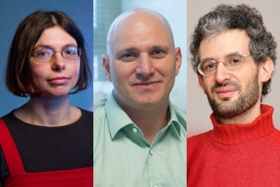Three MTA researchers win support from European Research Council
Three researchers from the MTA’s network of research institutes, an astronomer, a neuroscientist and a mathematician, have become grantees of the Consolidator Grant, the European Research Council’s (ERC) call for researchers with an independent research group. Maria Lugaro, Ádám Dénes and Dániel Marx can launch a five-year research program, with a maximum support of 2 million euros.
20 December, 2016
Maria Lugaro of Italy came to Hungary from Australia and set up an independent research group at the MTA Research Centre for Astronomy and Earth Sciences with the aid of the Momentum Project. The objective she intends to reach within the framework of the ERC grant is to ascertain, with the help of isotopes, the circumstances of the formation of the Sun and its planets. The result will also let us know whether this was an ordinary or extraordinary case.
 Maria Lugaro, Ádám Dénes, Dániel Marx
Maria Lugaro, Ádám Dénes, Dániel Marx Ádám Dénes, researcher at the MTA Institute of Experimental Medicine, examines the interaction between the brain and inflammatory processes in the human body. In particular, he wishes to understand what role microglia (the main inflammatory cell type in the brain) play in regulating the activity of neurons. A better knowledge of these interactions may lead to the development of such pharmaceutical ingredients that can mitigate the effects of stroke and, in addition, to a better understanding and better treatment of other brain diseases, such as Alzheimer’s disease.
Dániel Marx, researcher at the MTA Institute for Computer Science and Control, examines the efficient solvability of computational problems arising on graphs and networks. Graph modelling is a natural mathematical tool for road networks, telecommunications networks, intermolecular interactions and several other fields of application. Computational tasks require efficient solutions – according to current knowledge, however, algorithms that can solve problems on a general level and on arbitrary graphs cannot be hoped for. The aim of the research is to methodically explore the types of graphs with which problems reach a manageable level of complexity, also contributing to the success of fields of application.
The researchers were in part prepared by the Department of International Relations of the Secretariat of MTA acting as a National Contact Point (NCP).
The European Research Council operates the EU’s largest system of calls for proposals supporting discovery research. Its mission is to provide appealing long-term financing for pioneering, high-risk researches with the hope of high returns.
The Consolidator Grant is for researchers who have an independent research group with an independent research program but continue to work on the program’s consolidation. Proposals should have the promise of outstanding discovery or scientific breakthrough and a feasible research plan for a maximum of five years and a maximum of 2 million euros.
Besides the features of the proposed project and the researcher’s earlier scientific work, what bears key significance during assessment is the project leader’s commitment and, as evidence of this, the amount of time dedicated to the research project. Therefore, the winner must spend at least 40 per cent of their total working time on the project, and at least 50 per cent of their time must be spent in an EU country or an associated country.
